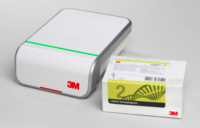Sample6 has announced that it was granted a new patent enabling extremely rapid and sensitive bacterial detection for the genus Listeria through the use of the proprietary phage-based luminescence assay.
The company was awarded a patent by the U.S. Patent and Trademark Office, strengthening the patent protection of its lead DETECT/L™ product. U.S. Patent No. 9,340,817, entitled "Methods of making recombinant phage, compositions and articles of manufacture of same for bacterial detection" discloses for the first time a cocktail of bacteriophages that in total can detect all species of the genus Listeria within a single work shift. Additionally, the patent discloses further invention in the field of synthetic biology to add to Sample6's unique synthetic biology engineering toolbox.
Synthetic Biology is at the core of the company's ability to innovate and materially improve food safety through in-shift, highly-sensitive detection of live bacterial pathogens.
Approved by the U.S. Department of Agriculture, the Association of Analytical Communities and plants across the country, Sample6 DETECT/L is the first in-plant, in-shift pathogen detection for Listeria. In fact, the company now helps ensure food safety at more than 30 plants in the U.S. and Canada, including leading ice cream, soy product and consumer packaged meats suppliers.



